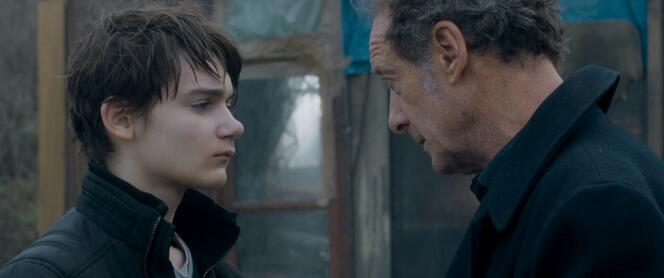THE OPINION OF THE “WORLD” – WHY NOT
The tenth feature film by Nicolas Boukhrief (The Conveyor2004, The confession, 2016) opens from the angle of a right of inventory within national education. We see Vincent Lindon conscientiously emptying his locker and his desk in the premises of the school where, we guess, his character worked. The actor plays Jacques Romand, a professor losing his senses who puts himself on “availability” before retirement age, because he no longer believes in it. Decades of wandering by the institution and its feeling of uselessness among students will have worn it down.
Failing to save them all, he will regain his footing by seeking to rescue only one, but until the end. Providence serves him on a platter in the person of Victor (Stefan Virgil Stoica), a Roma teenager reduced to delinquency and beaten by his people, whom he meets during a convenience store robbery. Temporarily removing him from the street, he takes with him the fundamentals of the educational gesture.
Social realism
Nicolas Boukhrief here puts aside the conventions of genre cinema to take a step into the register of social realism, which seems to indicate the presence of the cinematographer Eric Gautier, champion of the alert camera, and in front of it a Vincent Lindon as spokesperson for citizen distress, like straight out of a Stéphane Brizé film. Apart from a few passages “taken on the spot” (dinners with colleagues), Like a son However, it stands out from the simple observation. The staging, sober, coherent, focuses instead on building a preserved space between master and student, a bubble where something of their relationship can be reinvented, put back into perspective.
In its best moments, the film shows a reciprocal exchange between the adult and the adolescent. Particularly during this scene at the café where Victor, calling on his street knowledge, teaches Jacques how to probe the other customers by a few salient features. Wanting to save the little delinquent, it is the teacher, ultimately, who restores something of his self-confidence.
This one-on-one relationship conquered on a dilapidated social field is also the limit of the film. In the expression “like a son” the motif of a paternalism at half mast is evident, which here would be the real object to be restored. The feature film therefore does not escape a certain nostalgic verse on the deposed authority of old-style educators, true “fathers” of the Republic coming to replace the failing biological fathers – that of Victor being a torturer gang leader . This quest for the father also says something about Nicolas Boukhrief’s position as a filmmaker: a disciple in search of models to respect, conventions to maintain, narrative continuity. Hence a cinema that is held, solid, but which very often looks towards the past.
You have 3.86% of this article left to read. The rest is reserved for subscribers.
